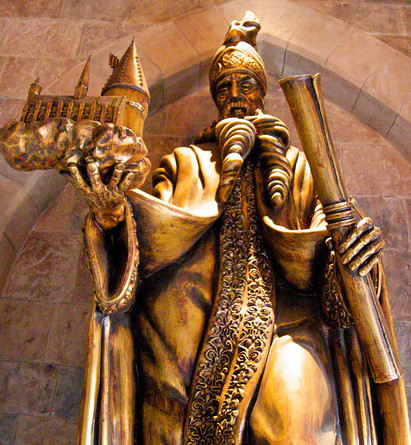Subject: Potterverse musings.
Author:
Posted on: 2017-11-21 10:34:00 UTC
This all goes back to the Salazar costume drama I suggested last year. You didn't think I'd just forgotten the concept, did you...?
-Question 1: Did the Hogwarts founders use wands?
I know that wands were present in Britain from the BC years (when an Ollivander came over from Rome), but so far as I can tell, there's no evidence of a Gryffindor, Hufflepuff, or Ravenclaw wand. There is a Slytherin wand, but the Harry Potter Wiki says he made it himself - and from snakewood, which doesn't seem to be a concept native to the UK (it's used for Australian acacias and a few New World trees).
So is it possible that wands were in a fallow period at the time of the Founders? Or perhaps Mr Ollivander lived in the British community in Wales, where Saxon Godric, Viking Helga, and Scottish Rowena wouldn't go (they being enemies and all). I may be way off-base, but is there even a possibility that their artefacts - the sword, cup, and diadem - served them in the same way that wands do nowadays? I can certainly imagine Godric channeling curses and spells through a sword.
-Question 2: When was Hogwarts Castle built?
Obviously Hogwarts was founded in AD 990 or so - but was the castle purpose-built for it? More specifically, I'm wondering if it could be built around the ancestral Ravenclaw home. It's in Scotland, and it would make more sense to use an existing building if one was available. We know that many modifications would have been made (Ravenclaw's magic staircases, Slytherin's cave of evil), but could they all be founded on Rowena's castle?
-Question 3: Which spells do not use a Latin incantation?
Yes, yes - 'Avada Kedavra'. That's where this question came from. Going by the Al-Salazar theory (that Slytherin was a Spanish Muslim of North African descent), I'm wondering if he was the one who introduced the Killing Curse to Britain. It certainly seems his style, and the one non-British Founder bringing the non-Latin curse is pretty tidy. So what else could he have contributed?
-Question 4: What's up with Merlin?
I had this idea that Merlin was the formulator of much of the pseudo-Latin magic - that he fit into the mold of the 'Last Roman', a Roman Empire wizard who settled in Britain during the collapse and gave us the pseudo-Latin structure of magic. Except... according to the wiki, Merlin went to Hogwarts, and therefore lived sometime around the Norman Conquest.
Which doesn't make a lot of sense! Merlin is supposed to have been part of King Arthur's court, but the kings in Britain in the 11th century onwards are very well documented, and there's no Arthur in there. Also: why do people keep invoking his name if he's a student of the Founders? Why don't they curse by Griffindor's beard and Ravenclaw's ears instead?
Two possibilities occur (other than 'Rowling mucked up the timeline', obvs):
--King Arthur was king of British Wizardry, setting his own government apart from the Norman kings of England. Shades here of the Raven King from Jonathan Strange & Mr Norrell, and the idea of a separate, magical kingdom that the Normans by turns respected and ignored. If we assume the Arthurian legends are similar in wizarding and Muggle tellings, Arthur's court would have fallen apart in civil war over the question of cooperation with the Muggles (rather than Saxons as the Muggles would have it). When Arthur and Mordred killed each other at Camlann, the wizarding world became subject to the Muggle monarchy. Merlin would be famous as the only Court Wizard in history - a sort of token of a Golden Age that never really existed.
--There are two Merlins. One was a gifted student in early Hogwarts, feted as the reincarnation/return of the other: the 5th-century wizard companion of the Muggle King Arthur. His story would be basically as we know it: standing against the Saxon invasion, and ultimately overwhelmed.
Would Merlin then be my post-Roman wizard, who set the magic of the British Isles into Latin so firmly that the Saxons, Vikings, and Normans all ended up adopting it? Or would he be the last stand of British magic, a Druidic (sorry, Ix!) practitioner of a form of the art which would soon be lost in face of the Continental Latin style?
Wait, that invokes another question:
-Question 5: Whence Latin?
We know that Rome was a source of magical knowledge: the first Ollivander was Roman, plus there's all that Latin. Assuming Latin!Merlin isn't a thing, can we guess that the claim Ollie 1 came over with the Romans in the 300s BC means he came over with Roman magic? Ie, that the first appearance of Latin spells in Britain was in 382 BC. That at least solves the issue of a 400-year-early Roman invasion.
But... why would the Saxons and Vikings use the same spells? They drove the British out! Shouldn't they have kept using the spells of Saxony and Scandinavia? And given that the Saxons in particular defined themselves in opposition to Rome, I don't feel like that would have been Latin-based.
I know Latin is the language of scholarship, but the reason for that is the Catholic Church. In which case... is there a possibility that the Church used magic? And that when they came over to convert the Saxons, they also converted them to the 'better' Latin magic? Combined with the introduction of wands (not as good as Ollivander's, obviously, but who'd buy from a Briton), they could probably make a pretty good case.
I don't know, maybe I'm completely off-track here. But it definitely feels like the prevalence of Latin among people who have no reason to adopt it needs an explanation.
hS
